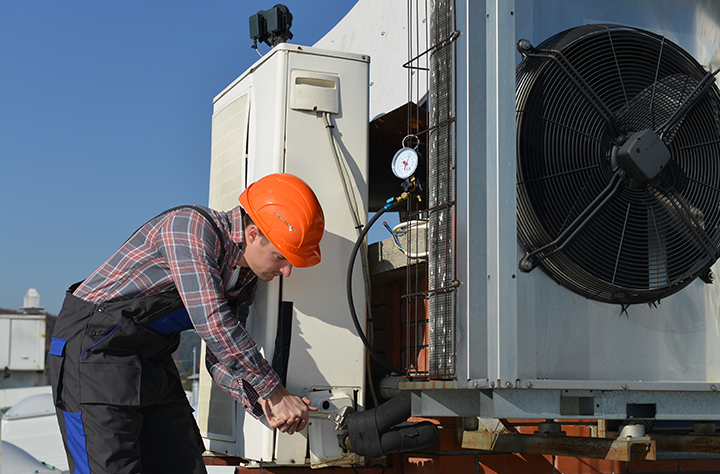In today’s business environment, maintaining a comfortable indoor climate is crucial for productivity and employee satisfaction. Commercial HVAC (Heating, Ventilation, and Air Conditioning) systems play a vital role in achieving this goal. Understanding the intricacies of these systems, along with their maintenance and repair needs, can help businesses optimize performance and minimize downtime.
What is a Commercial HVAC System?
A commercial HVAC system is designed to provide heating, cooling, and ventilation for large buildings such as offices, retail spaces, and industrial facilities. Unlike residential HVAC systems, commercial systems are typically larger, more complex, and require specialized components to manage the varying demands of different spaces.
Components of Commercial HVAC Systems
- Heating Units: These may include boilers or heat pumps that generate warmth and distribute it throughout the building.
- Cooling Units: Chillers and air conditioning units are responsible for lowering indoor temperatures, providing comfort during hot weather.
- Ventilation Systems: Proper ventilation is essential for maintaining indoor air quality. These systems filter and circulate air, removing pollutants and ensuring a steady supply of fresh air.
- Control Systems: Thermostats and building management systems allow for the efficient control of heating and cooling, helping to maintain optimal conditions and conserve energy.
Importance of Regular Maintenance
Regular maintenance is critical to the longevity and efficiency of commercial HVAC systems. Neglecting maintenance can lead to various issues, including decreased efficiency, higher energy costs, and unexpected breakdowns.
Key Maintenance Tasks
- Filter Replacement: Air filters should be checked and replaced regularly to prevent dust and debris from accumulating, which can hinder airflow and lead to system strain.
- Duct Cleaning: Regular cleaning of ductwork helps maintain good air quality and ensures that the HVAC system operates efficiently.
- Refrigerant Levels: Monitoring refrigerant levels in air conditioning units is essential for maintaining cooling efficiency. Low refrigerant can indicate leaks that require immediate attention.
- System Inspections: Routine inspections by qualified technicians can identify potential issues before they escalate. This proactive approach can save businesses significant repair costs and prevent system failures.
Repair Essentials
Even with regular maintenance, commercial HVAC systems may experience issues that necessitate repair. Understanding common problems and their solutions can help facility managers address these challenges promptly.
Common HVAC Problems
- Inconsistent Temperatures: This issue often arises from improper calibration of thermostats or issues with ductwork. A professional evaluation can pinpoint the exact cause and recommend solutions.
- Unusual Noises: Grinding, rattling, or hissing noises can indicate mechanical problems or loose components. Addressing these issues quickly can prevent further damage and costly repairs.
- Poor Airflow: Insufficient airflow can result from clogged filters, blocked ducts, or malfunctioning fans. Ensuring proper airflow is essential for maintaining comfort and system efficiency.
- Frequent Cycling: If the HVAC system frequently turns on and off, it may be a sign of an oversized unit, thermostat issues, or airflow obstructions. A thorough assessment is needed to resolve this issue.
Choosing the Right Commercial HVAC Services
Selecting a reputable provider for commercial hvac services is crucial for ensuring the effective maintenance and repair of your systems. Here are some tips for making the right choice:
Credentials and Experience
Look for HVAC service providers with the necessary certifications, licenses, and insurance. Experienced technicians are more likely to identify issues accurately and provide effective solutions.
Comprehensive Services
Choose a provider that offers a full range of services, including installation, maintenance, and emergency repairs. This ensures that all aspects of your HVAC system are handled by qualified professionals.
Customer Reviews
Research customer feedback to gauge the quality of service provided. Positive reviews and testimonials can give you confidence in your choice of service provider.
Preventive Maintenance Plans
Inquire about preventive maintenance agreements that offer regular inspections and services at a discounted rate. This proactive approach can help you avoid unexpected breakdowns and extend the lifespan of your equipment.
Conclusion
Understanding the fundamentals of commercial HVAC systems, along with their maintenance and repair needs, is essential for any business. Regular maintenance not only enhances system efficiency but also ensures a comfortable environment for employees and customers. By selecting the right commercial HVAC services, businesses can effectively manage their HVAC systems, ensuring optimal performance and longevity. Investing in these systems will ultimately contribute to a more productive and comfortable workplace.
